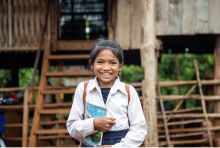
Meet Tbong. She is a happy 3rd grade student at Kror La Primary School, a CARE supported multi-lingual education school in Ratanak Kiri province in Cambodia’s remote northeast. The area is home to many Indigenous ethnic minorities, including the Kreung and Tampuen. The communities working with CARE on the Education for Ethnic Minorities program are mostly subsistence or small-scale cash crop farmers, or plantation labourers.
Tbong’s school was established in 2002 and she already has more formal education than either of her parents. Her 17-year-old sister Nang Dong is at secondary school in the nearest town of Ban Lung, thanks to a scholarship from CARE.
“I am ten years old and I’m in Grade 3. There are six people in my family – two sisters, one brother, my parents and me. Every day I wake up, wash my face and go to collect water. Then I pack up my bed and mosquito net and walk to school.
At school we do subjects like maths, Khmer and social sciences. I like coming to school because I want to learn and know things. My mum doesn’t have any education but my dad went up to Grade 2. My mum is happy that I’m coming to school.
My teacher Chorvey is my role model because she’s hard working and kind to people. After I graduate, I’ll hopefully become a teacher. To become a teacher I’ll need to stay in school and study hard.”
CARE’s Education for Ethnic Minorities program has recently been handed over to the Cambodian government. The project has given Indigenous children the opportunity to learn in their own language, with the gradual introduction of the national language, Khmer. Previously many students dropped out of school or did not go at all because they didn’t understand Khmer. The project has focussed on Grades 1 to 3 and aims to prepare students for Grades 4 and up, which are only taught in Khmer.
CARE has helped to recruit and train Indigenous teachers, with a particular focus on women teachers. Most of the teachers we met had attended school up to Grades 8 or 9, and had received further training from CARE. CARE has produced textbooks and other classroom resources in four Indigenous languages to further support the students in their learning. The textbooks cover the national curriculum and also incorporate elements of Indigenous culture and lifestyles. The project aims to contribute to the preservation of Indigenous languages and cultural heritage.
As you can imagine Tbong’s father is very proud of his daughters getting an education – “We are very happy that Tbong and Nang Dong are learning because my wife and I don’t have an education. My other daughter and my son both quit school to get married, and I regret that now. Tbong and Nang Dong will hopefully be able to work in professional jobs and the others will have to continue working on the farm. Although I can’t be certain about my daughters’ futures, they will have knowledge, and that’s the main thing.”
People like you make it possible for girls like Tbong to get an education. Thank you for supporting CARE’s life changing work.
Publié:
octobre 7, 2019
Auteur:
CARE Canada
Catégories:
Partager cette publication: